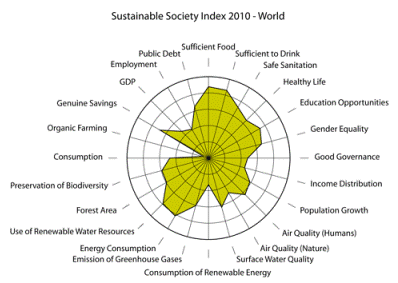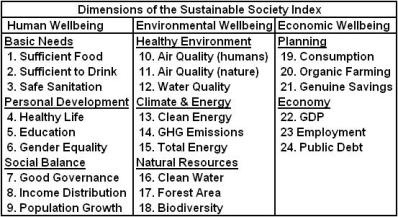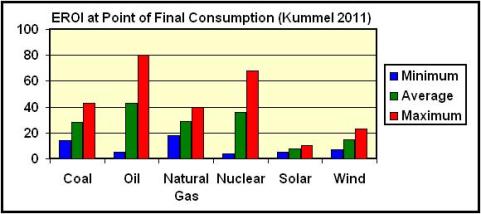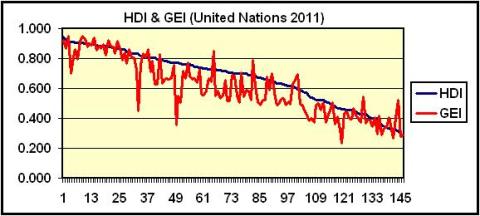
|
Mother Pelican
A Journal of Sustainable Human Development
Vol. 8, No. 2, February 2012
Luis T. Gutiérrez, Editor
|
|
|
|

|
|
|
|
Fragments of the Transition to Sustainability
|
SUMMARY
The mindboggling complexity of global ecological economics, and the huge risks that will have to be managed during the transition to sustainability, make it imperative to use disciplined thinking about crucial issues and decisions that must nevertheless be made without undue procrastination. Clean energy and gender equality are just two fragments in the puzzle of sustainability, but both are pervasive. To the extent that progress in the transition to sustainability is contingent on human development and adaptation to energy scarcity, which in turn is hard to envision under a patriarchal "aggressive growth" mentality, these two fragments are critical. Given the biophysical evidence on energy conversion efficiencies, and given that human development is tightly coupled to gender equality, attempting the transition to sustainability in a patriarchal society is an oxymoron. Undergoing the risky transition is inevitable, but will necessitate breaking new ground in both energy technologies and human relations.
OUTLINE
Page 1. Editorial Essay ~ Fragments of the Transition to Sustainability
Page 2. There's No Such Thing as Ethical Oil (or Nuclear Power), by Evan O'Neil
Page 3. Debt Slavery – Why It Destroyed Rome, by Michael Hudson
Page 4. Responsible Finance and Economic Justice, by David McNair
Page 5. On the Demographic Doomsday Diagram, by
Arup Kanti Konar
Page 6. Traditional Knowledge & Climate Change, by Gleb Raygorodetsky
Page 7. The Masculinity Conspiracy - Part 5: Fatherhood, by Joseph Gelfer
Page 8. Hydrocarbons, Metals and Alternative Energy, by John Petersen
Page 9. The Role of Universities in Sustainable Development , by Walter Leal Filho
The following supplements have been updated:
Supplement 1: Advances in Sustainable Development
Supplement 2: Directory of Sustainable Development Resources
Supplement 3: Long-Term Strategies for Sustainable Energy
Supplement 4: Short-Term Strategies for Sustainable Energy
Supplement 5: Fostering Gender Equality in Society
Supplement 6: Fostering Gender Equality in Religion
"For most of the last century, economic growth was fuelled by what seemed to be a certain truth: the abundance of natural resources. We mined our way to growth. We burned our way to prosperity. We believed in consumption without consequences. Those days are gone. In the twenty-first century, supplies are running short and the global thermostat is running high. Climate change is also showing us that the old model is more than obsolete. It has rendered it extremely dangerous. Over time, that model is a recipe for national disaster. It is a global suicide pact." UN Secretary-General Ban Ki-moon’s remarks to the World Economic Forum session on redefining sustainable development, Davos, Switzerland, 28 January 2011. For the complete text, click here. For the latest on the January 2012 World Economic Forum, click here.
|
|
Editorial Essay
Fragments of the Transition to Sustainability
|
"Agricultural expansion and climate variability have become important agents of disturbance in the Amazon basin. Recent studies have demonstrated considerable resilience of Amazonian forests to moderate annual drought, but they also show that interactions between deforestation, fire and drought potentially lead to losses of carbon storage and changes in regional precipitation patterns and river discharge. Although the basin-wide impacts of land use and drought may not yet surpass the magnitude of natural variability of hydrologic and biogeochemical cycles, there are some signs of a transition to a disturbance-dominated regime. These signs include changing energy and water cycles in the southern and eastern portions of the Amazon basin." The Amazon basin in transition, Eric A. Davidson et al., Nature, 19 January 2012
"The main problem that we face is that we will require massive new investments in whatever might become the next energy source at a time when most citizens will be experiencing a decline in their own purchasing power. For example, if gasoline today costs $4 a gallon (and this just to extract that gallon from an aging, energy-requiring field) who will want to pay an extra $5 a gallon as an investment in whatever fuel or whatever will be needed to replace that gallon? The answer is probably few, if any, and that implies that we just continue on the path of using ever-lower grade, more expensive conventional resources, slowly grinding into ever-greater poverty."
Energy and the Wealth of Nations: Understanding the Biophysical Economy, Charles A. S. Hall & Kent A. Klitgaard, Springer, 2012, p. 394
These warnings will not induce any change in human behavior towards our natural habitat. However, for anyone who is interested in the present and future of humanity, they should induce the need for a critical rethinking of consumerist priorities; and such rethinking undoubtedly should include the current political climate in which not much is done except abusing authority and evading responsibility by pointing fingers at vulnerable scapegoats. President Barack Obama's decision to deny permission for construction of the Keystone XL pipeline is a refreshing sign of hope, even though it was made only when Congress forced him to act now. But it seems that, just as the 20th century was the century of growth, the 21st century will be the century of scapegoating.
Critical Thinking
The mindboggling complexity of global ecological economics, and the huge risks that will have to be managed during the transition to sustainability, make it imperative to use disciplined thinking about crucial issues and decisions that must nevertheless be made without undue procrastination. This brings to mind the rigor of the scientific method, which should be used to the maximum possible extent and, as a Nature recent editorial stated, "Where political leadership on climate change is lacking, scientists must be prepared to stick their heads above the parapet."
Beyond scientific support, courage and a good dosage of wisdom will be needed by those in authority. Common global citizens would be wise to let go of superficial advocacy slogans and discipline themselves to think hard and think critically about the risks associated with complex issues such as population growth, patriarchal violence, financial entropy, cultural biases, economic inequality, and finite natural resources.
With regard to critical thinking, the reader is invited to check some useful guidelines such as the Six Levels of Thinking (Knowing - Understanding - Applying - Analyzing - Evaluating - Creating) and the more comprehensive 35 Dimensions of Critical Thinking. For other useful resources, visit the Critical Thinking Community. It should be noted that being a "rocket scientist" or a "philosopher guru" is not required to think critically; what is required is a bit of self-discipline and willingness to keep asking questions, and testing answers, whether or not it is "politically correct" to do so. Any global citizen can ask honest questions and test the validity of answers, always checking for possible repercussions at the local, national, and global levels.

Spider web graph of the Sustainable Society Index (SSI) 2010 - World. This graph shows the level of sustainability for the world as a whole, calculated as the unweighted average of the values of 151 countries, covering over 99% of the total world population. All scores for all 24 dimensions are calculated on a scale of 0 to 10, where 10 represents full sustainability. The SSI website provides spider web graphs for each of the 151 countries as well as interactive world maps to analyze the geographic distribution for the three wellbeing dimensions.

|
Complexity and Risks of the Transition to Sustainability
The Sustainable Society Index (SSI) provides a good snapshot of the consumerism-to-sustainability transition complexity. The SSI 2010 is an integrated analysis of 24 dimensions of complexity, as shown in the spider web chart to the right. A number of very insightful conclusions were derived from this analysis. For example:
"The world at large is – with a score of 5.9 on a scale of 0 to 10 – only just over halfway to a sustainable world."
"Two indicators show alarmingly low figures: Consumption of Renewable Energy has a score of 3.2 and Organic Farming an even way lower score of 0.7."
"Many indicators show progress over the past 4 years, above all those expressing Basic Needs and Personal Development, except for Gender Equality."
Reducing the global sustainability status to a single number may be an unreasonable exercise, but 5.9 (or 59%) sounds reasonable. The latest estimate of the ecological footprint is 1.5 planets (or 150% of planet's carrying capacity). Two different numbers, but they convey the same message: wake up!
In their book, Energy and the Wealth of Nations: Understanding the Biophysical Economy, Hall & Klitgaard provide a detailed explanation of the reason for the slow growth for renewable energy usage. The reason is that the "Energy Return on Energy Invested" (EROI) is significantly higher for fossil fuels than for "clean" (wind, solar, ...) energy. EROI is basically the ratio of energy delivered to consumers over energy spent in finding, recovering, and delivering energy from a given resource. A low physical EROI generally correlates with low financial return on dollars invested. As long as delivering energy is driven by financial profit, investing in clean energy is unattractive. Since energy is required for all human activity, and we have become accustomed to cheap high-EROI energy, the ramifications of this fact are pervasive and do not bode well for the future of clean energy and the transition to sustainability. So is the case for water and other natural resources. See the following:
- Ever-increasing Nonrenewable Natural Resource (NNR) Scarcity, Christ Clugston, Wake Up Amerika!, January 2012.
- Energy and water – the real blue-chips, Nate Hagens & Kenneth Mulder, Fleeing Vesuvius, 20 August 2011.
- System Energy Assessment (SEA), Defining a Standard Measure of EROI for Energy Businesses as Whole Systems, Philip F. Henshaw et al., Sustainability, 18 October 2011.
- The Second Law of Economics: Energy, Entropy, and the Origins of Wealth, Reiner Kümmel, Springer, 2011.
- The following graph shows EROI data for coal, oil, natural gas, solar, and wind at the point of final consumption (i.e., at the end of the supply chain). Is it possible to have economic growth in a low-EROI economy?

EROI is the ratio of the energy output of a process
to the direct and indirect energy inputs to that process
Source: The Second Law of Economics,
Reiner Kümmel, Springer, 2011
The lack of progress with regard to gender equality is also worrisome. Specifically, gender-related exclusionary practices in many jobs and professions are a continuing tragedy for human civilization worldwide. Whereas the transition to sustainability is contingent on a culture of nonviolence, such practices actually perpetuate the macho propensity to violence with nefarious consequences for human relations and the integrity of the human habitat. It is a sad reality that subtle (and not so subtle) forms of patriarchal violence are further reinforced by religious institutions that continue to foster male-only images of God - and the theological absurdity of restricting official ministries to men alone - even though they might uphold the dignity of women. See the following:
- MEXICO: Even Educated Young Women Face Poor, Jobless Future, Guadalupe Cruz Jaimes, IPS, 17 January 2012.
- Eco-Feminist Goddess Spirituality: A Theology for a Sustainable Future, Karen Tate, Goddess Thealogy, December 2011.
- Gender Segregation and Inequality inside Israel and Palestine, William Gibson, International Middle East Media Center, 30 November 2011.
- Manifesto for Integrated Action on the Gender Dimension in Research and Innovation, European Gender Summit, Brussels, 8-9 November 2011.
- The following graph shows Human Development Index (HDI) and Gender Equality Index (GEI) for 145 countries in order of decreasing HDI. Is it possible to attain sustainability in a low GEI society?

Gender Equality Index (GEI) = 1 - Gender Inequality Index (GII)
and is a component of the Human Development Index (HDI)
Source:
Human Development Report, United Nations, 2011
Clean energy and gender equality are just two fragments in the puzzle of sustainability, but both are pervasive. To the extent that progress in the transition to sustainability is contingent on human development and adaptation to a low-EROI economy, which in turn is hard to envision under a patriarchal "aggressive growth" mentality, these two fragments are critical. Given the biophysical evidence on energy conversion efficiencies, and given that human development is tightly coupled to gender equality, attempting the transition to sustainability in a patriarchal society is an oxymoron. Undergoing the risky transition is inevitable, but will necessitate breaking new ground in both energy and culture. The social and economic risks will be high indeed.
Muddling Through the Transition
In his classical articles, The Science of 'Muddling Through' (1959) and Still Muddling, Not yet Through (1979), Charles Lindblom provided what is perhaps the most realistic vision of how complex and risky transitions are accomplished: one step at a time. The transition to sustainability will be an evolutionary process, and one that will entail a succession of minor (and hopefully nonviolent) revolutions. Aside from prayer, the best we can do to minimize the pain and foster progress is to take each successive step in peace, taking into account the limits of our finite planet, and considering all possible repercussions of stepwise decisions - this is where the six levels of thinking and the 35 dimensions of critical thinking come into play. There is no going back to primitive thinking and the patriarchal paradigm of uncritical rivalry and victimization. Critical thinking, in pursuit of creativity in solidarity, is the way going forward:
"The economy is a wholly owned subsidiary of the environment, not the reverse."
~ Herman Daly, Steady-State Economics (1977)
In other words,
the economy is a wholly owned subsidiary of Creation, not the reverse.
|
|
ADDENDUM TO PREVIOUSLY PUBLISHED ARTICLE
Note on the article titled Political Engagement with Design: A Design Intervention for Local Development in an Area of Gentrification in Istanbul by Cigdem Kaya and Burcu (Yancatarol) Yagiz:
The entitled article above is based on a conference paper: ‘Other Design at Sulukule: A Local Development Project in a Degenerated Historical Area of Istanbul under the Threat of Demolition’ by Cigdem Kaya, Burcu Yancatarol and Asli Kiyak Ingin presented at the Changing The Change Conference (held between 10-12 July 2008, Torino, Italy) and was published in the conference proceedings. The authors (Cigdem Kaya and Burcu(Yancatarol) Yagiz) add this article to the references as:
Kaya, C., (Yancatarol) Yagiz, B. and Ingin, A.K., (2008). ‘Other Design at Sulukule: ALocal Development Project in a Degenerated Historical Area of Istanbul under the Threat of Demolition’ in Changing the Change Conference Proceedings, (eds.) Cipolla, C. And P.P. Peruccio, Allemandi Conference Press, pp. 823-835.
|
|Back to SUMMARY & OUTLINE|
Page 1
Page 2
Page 3
Page 4
Page 5
Page 6
Page 7
Page 8
Page 9
Supplement 1
Supplement 2
Supplement 3
Supplement 4
Supplement 5
Supplement 6
PelicanWeb Home Page
|
|
|
"The profit from the Earth is for all."
Ecclesiastes 5:9
|
|
Page 1
|
|
FREE SUBSCRIPTION
|
![[groups_small]](groups_small.gif)
|
Subscribe to the
Mother Pelican Journal
via the Solidarity-Sustainability Group
Enter your email address:
|
|
|
|